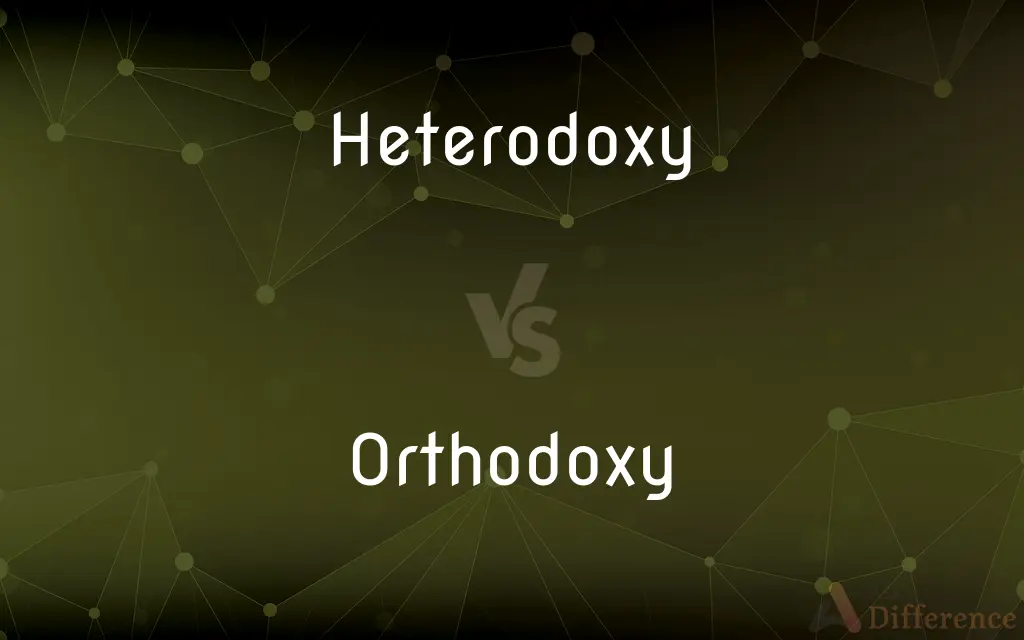Heterodoxy vs. Orthodoxy — What's the Difference?
By Urooj Arif & Maham Liaqat — Updated on April 5, 2024
Heterodoxy refers to beliefs, opinions, or practices that deviate from established or traditional standards, especially in context to religious or cultural norms. Orthodoxy embodies adherence to accepted, conventional principles in religious doctrines.

Difference Between Heterodoxy and Orthodoxy
Table of Contents
ADVERTISEMENT
Key Differences
Heterodoxy encompasses a range of beliefs, practices, or opinions that diverge from and often challenge the conventional or officially accepted standards within a religious, philosophical, or cultural context. This divergence is not merely a deviation but represents a critical stance or alternative approach that questions the status quo, providing new interpretations or perspectives. Orthodoxy, on the other hand, signifies a strict adherence to established doctrines and practices, especially within a religious framework. It embodies the preservation of traditional beliefs and rituals, asserting a continuity of faith and practice that aligns with historical or canonical standards.
Heterodox views are often seen in contrast to mainstream ideologies and can lead to the formation of new sects, movements, or schools of thought that seek to redefine or expand upon traditional understandings. Orthodox positions are characterized by their commitment to maintaining the purity of doctrine as interpreted by authoritative bodies or texts, often viewing themselves as guardians of true belief against misinterpretation or heresy.
The distinction between heterodoxy and orthodoxy is fundamentally about the relationship to established norms and authority. Heterodoxy challenges and seeks to reinterpret or reform established norms, often advocating for a broader, more inclusive or revised understanding. Orthodoxy seeks to preserve and adhere to traditional norms, emphasizing continuity, stability, and fidelity to established interpretations.
In religious contexts, this distinction is particularly pronounced, with orthodoxy defining the boundaries of acceptable belief and practice, while heterodoxy pushes against these boundaries, introducing alternative interpretations and practices. However, the concepts of heterodoxy and orthodoxy can apply broadly, including in political, cultural, and academic fields, wherever there are established norms and authoritative standards.
Culturally and historically, the dynamics between heterodoxy and orthodoxy have fueled intellectual, theological, and social evolution, with heterodox movements often spurring change and innovation, while orthodoxies strive to maintain cohesion and continuity. The tension between these forces can lead to conflict, schism, or reform, shaping the development of societies and institutions over time.
ADVERTISEMENT
Despite their differences, both heterodoxy and orthodoxy play crucial roles in the cultural and intellectual landscapes, contributing to the diversity of thought and belief systems. While orthodoxy ensures the preservation of tradition and identity, heterodoxy encourages exploration, questioning, and the potential for growth and change.
Comparison Chart
Definition
Beliefs or practices that deviate from established norms.
Adherence to established or conventional beliefs and practices.
Characteristic
Questions and challenges the status quo.
Preserves traditional norms and continuity.
Context
Often arises in contrast to mainstream or authoritative standards.
Defined by alignment with historical or canonical standards.
Outcome
Can lead to new interpretations, sects, or movements.
Maintains the purity and stability of doctrine.
Role
Spurs change and innovation by redefining norms.
Ensures cohesion and continuity by adhering to tradition.
Compare with Definitions
Heterodoxy
Heterodoxy thrives on intellectual and cultural diversity.
A heterodox approach to education encourages critical thinking and creativity.
Orthodoxy
Orthodoxy adheres to established beliefs and rituals.
The community's strict orthodoxy dictated all aspects of social life, from dress to worship.
Heterodoxy
Heterodoxy represents alternative beliefs that challenge traditional norms.
The artist's heterodox approach to classical themes intrigued many but was criticized by traditionalists.
Orthodoxy
It resists changes to established norms.
The political party's orthodoxy left little room for progressive ideas.
Heterodoxy
Heterodoxy can lead to the formation of new movements.
The heterodox sect within the church eventually formed its own denomination.
Orthodoxy
Orthodoxy serves as a guardian of purity in doctrine.
The church council reaffirmed its commitment to orthodoxy by denouncing the new interpretations.
Heterodoxy
It encourages questioning and exploring beyond conventional boundaries.
Her heterodox theories on economics gained attention for their innovative solutions to old problems.
Orthodoxy
It emphasizes continuity and tradition.
Orthodox scholars worked to preserve ancient texts and rituals in their original form.
Heterodoxy
It is often labeled as non-conformist or revolutionary.
The philosopher's heterodox views were initially dismissed but later became influential.
Orthodoxy
Orthodoxy is often equated with conventional wisdom.
In science, challenging the orthodoxy can lead to significant breakthroughs.
Heterodoxy
In religion, heterodoxy (from Ancient Greek: héteros, "other, another, different" + dóxa, "popular belief") means "any opinions or doctrines at variance with an official or orthodox position." Under this definition, heterodoxy is similar to unorthodoxy, while the adjective 'heterodox' could be applied to a dissident. Heterodoxy is also an ecclesiastical term of art, defined in various ways by different religions and churches.
Orthodoxy
Orthodoxy (from Greek: ὀρθοδοξία, orthodoxía, 'righteous/correct opinion') is adherence to correct or accepted creeds, especially in religion.Orthodoxy within Christianity refers to acceptance of the doctrines defined by various creeds and ecumenical councils in Antiquity, but different Churches accept different creeds and councils. Such differences of opinion have developed for numerous reasons, including language and cultural barriers.
Heterodoxy
The condition or quality of being heterodox.
Orthodoxy
The quality or state of being orthodox.
Heterodoxy
A heterodox opinion or doctrine.
Orthodoxy
Orthodox practice, custom, or belief.
Heterodoxy
The quality of being heterodox.
Orthodoxy
The beliefs and practices of the Eastern Orthodox Church.
Heterodoxy
A heterodox belief, creed, or teaching.
Orthodoxy
Orthodox Judaism.
Heterodoxy
An opinion or doctrine, or a system of doctrines, contrary to some established standard of faith, as the Scriptures, the creed or standards of a church, etc.; heresy.
Orthodoxy
Correctness in doctrine and belief.
Heterodoxy
Any opinions or doctrines at variance with the official or orthodox position
Orthodoxy
Conformity to established and accepted beliefs (usually of religions).
Heterodoxy
The quality of being unorthodox
Orthodoxy
Soundness of faith; a belief in the doctrines taught in the Scriptures, or in some established standard of faith; - opposed to heterodoxy or to heresy.
Basil himself bears full and clear testimony to Gregory's orthodoxy.
Orthodoxy
Consonance to genuine Scriptural doctrines; - said of moral doctrines and beliefs; as, the orthodoxy of a creed.
Orthodoxy
By extension, said of any generally accepted doctrine or belief; the orthodox practice or belief.
Orthodoxy
The quality of being orthodox (especially in religion)
Orthodoxy
A belief or orientation agreeing with conventional standards
Common Curiosities
Is orthodoxy always religious?
While often associated with religion, orthodoxy can apply to any domain with established norms and authoritative standards, including politics, academia, and culture.
Can heterodoxy become orthodoxy?
Yes, over time, heterodox ideas that gain widespread acceptance can become the new orthodoxy as societies and their beliefs evolve.
Are heterodox views always progressive?
Not necessarily. Heterodox views simply challenge the status quo, which can be progressive, regressive, or simply different, depending on the context and perspective.
What challenges do heterodox movements face?
Heterodox movements often face opposition, marginalization, or persecution from established authorities and mainstream society until they gain acceptance.
What role does orthodoxy play in maintaining cultural identity?
Orthodoxy helps preserve cultural identity and continuity by upholding traditional beliefs, practices, and values across generations.
How do heterodoxy and orthodoxy affect innovation?
Heterodoxy can be a catalyst for innovation by questioning and expanding beyond traditional boundaries, while orthodoxy can provide a stable framework within which innovation can be contextualized.
How does heterodoxy influence society?
Heterodoxy can drive social, cultural, and intellectual evolution by challenging established norms and introducing new ideas and practices.
How do institutions react to heterodoxy?
Institutions often resist heterodoxy to maintain stability and continuity, although they may eventually adapt to or incorporate heterodox ideas under certain conditions.
Can one be both orthodox and heterodox?
Individuals or groups can hold orthodox views in one context while adopting heterodox positions in another, depending on the norms and standards of each domain.
What is the significance of debate between heterodoxy and orthodoxy?
Debate between these viewpoints fosters a dynamic exchange of ideas, contributing to the intellectual and cultural development of societies.
Share Your Discovery

Previous Comparison
Welsh vs. Welch
Next Comparison
Blunderbuss vs. MusketoonAuthor Spotlight
Written by
Urooj ArifUrooj is a skilled content writer at Ask Difference, known for her exceptional ability to simplify complex topics into engaging and informative content. With a passion for research and a flair for clear, concise writing, she consistently delivers articles that resonate with our diverse audience.
Co-written by
Maham Liaqat













































